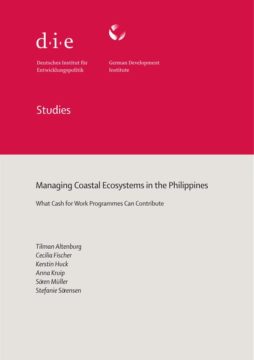Many coastal resources, including fish stocks and mangrove forests, are “common pool resources”. It is difficult to exclude anyone interested from harvesting them, which typically results in overexploitation.
The study compares three incentive schemes that may induce resource users to protect or rehabilitate coastal resources: Payments for Ecosystem Services, Environmental Conditional Cash Transfers and Cash for Work. We find that the first two have many prerequisites that make nationwide application very difficult, particularly in developing countries. Cash for Work is easier to implement and works well as a second-best alternative.
We document two cases of Cash for Work aimed at the protection of common pool resources in the Philippines: (1) a policy experiment whereby Cash for Work was used to offer alternative sources of income to fisherfolk during a temporary fishing ban when the commercially most important species spawn, and (2) mangrove reforestation programmes. Overall, Cash for Work proved to be effective, but its success was contingent upon policy design. For both cases, the study specifies in detail what is needed to make Cash for Work effective in environmental and social terms.
- Veröffentlicht am Samstag 16. November 2024 von Deutsches Institut f. Entwicklungspolitik
- ISBN: 9783960210337
- 108 Seiten
- Genre: Gesellschaft, Politik, Sachbücher, Volkswirtschaft, Wirtschaft
